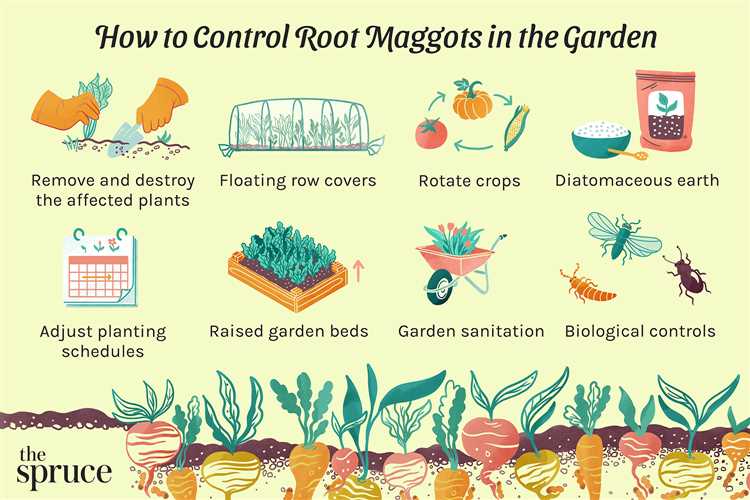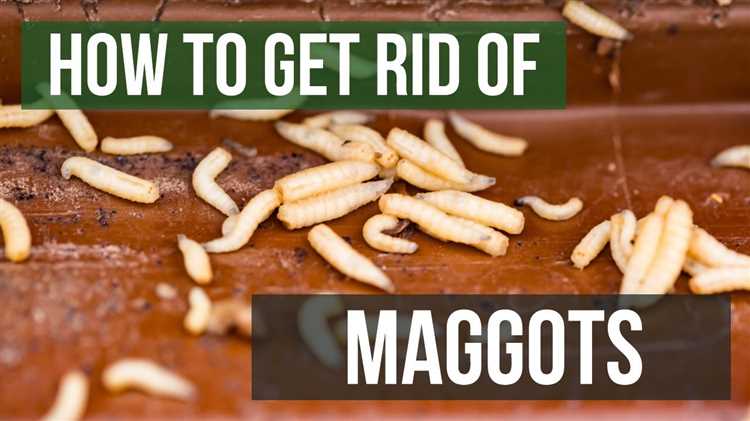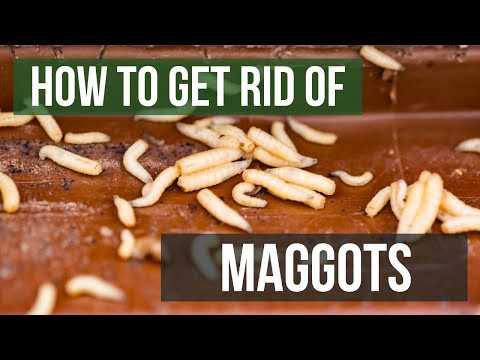Maggots, the larval stage of flies, can be a nuisance and a health hazard when they infest your home or garden. These squirming creatures feed on decaying organic matter and can quickly multiply if not dealt with promptly. Luckily, there are several effective methods to instantly kill maggots and prevent infestations from spreading.
One of the most common and straightforward methods to kill maggots is by using boiling water. Boiling water is a simple solution that can be easily implemented in any setting. Simply locate the maggot-infested area, boil a pot of water, and carefully pour it over the affected area. The hot water will scorch and kill the maggots, preventing them from causing further damage.
Vinegar is another effective solution to kill maggots instantly. Its acidic nature is lethal to maggots and can effectively destroy them on contact. Mix equal parts vinegar and water in a spray bottle and spray it directly onto the maggots. The maggots will quickly die and can then be safely disposed of.
- Learn powerful techniques to eliminate maggots instantly
- 1. Boiling Water
- 2. Vinegar Solution
- Identify the source of maggot infestation
- Common sources of maggot infestation
- Identifying the source
- Clean and sanitize affected areas to prevent maggot growth
- Apply natural repellents to repel and kill maggots
- Use chemical insecticides for effective maggot extermination
- Choosing the right insecticide
- Application methods
- Question-answer:
- What are maggots and why are they considered a problem?
- Are there any household products that can be used to instantly kill maggots?
- How can boiling water be used to kill maggots?
- What are some natural methods to kill maggots?
Learn powerful techniques to eliminate maggots instantly
Maggots can be a nuisance when they infest your home or garden. These small, worm-like creatures can cause damage to your property and spread disease. It is important to take immediate action to eliminate maggots in order to prevent further infestation. Here are some powerful techniques that can help you get rid of maggots instantly:
1. Boiling Water
Boiling water is a simple yet effective method to kill maggots. Simply boil a pot of water and pour it directly on the maggots. The boiling water will instantly kill the maggots and prevent them from causing any more damage. Make sure to wear protective gloves to avoid burning yourself.
2. Vinegar Solution
Vinegar is another powerful ingredient that can eliminate maggots instantly. Mix equal parts of vinegar and water in a spray bottle and directly apply it to the maggots. The acidic nature of vinegar will kill the maggots on contact. This method is safe to use indoors and outdoors.
Remember to clean the affected area thoroughly after using any of these techniques to ensure that there are no remaining maggots or eggs. Additionally, it is important to identify and fix the source of the infestation to prevent future occurrences.
Caution: Always follow safety guidelines and instructions when using these methods. Avoid direct contact with maggots and wear protective gear if necessary. If the infestation persists or worsens, it is recommended to seek professional help.
In conclusion, using boiling water and vinegar solution are two powerful techniques to instantly kill maggots. By taking immediate action and following these methods, you can effectively eliminate maggots and prevent further infestation.
Identify the source of maggot infestation
Maggot infestations can be a nuisance and pose a health risk if not addressed promptly. To effectively eliminate maggots, it is crucial to identify and eliminate the source of the infestation. Without eliminating the source, the problem is likely to persist or reoccur.
Common sources of maggot infestation
1. Open garbage cans or dumpsters: Maggots are attracted to decaying organic matter, such as food scraps and waste. Open garbage cans or dumpsters provide these ideal conditions for maggots to thrive.
2. Dead animals: If there are dead animals in or near your property, maggots may be feeding on the decaying flesh. The presence of maggots can indicate the need to remove the dead animal and address any related hygiene issues.
3. Pet waste: Pet waste, especially if left uncleaned for an extended period, can attract flies that lay their eggs, resulting in maggot infestation.
4. Rotting vegetation: Fruits, vegetables, or plants that are rotting or decomposing can become breeding grounds for maggots. It is essential to remove any such materials promptly.
Identifying the source
Inspecting the affected area carefully can help in identifying the source of the maggot infestation. Look for signs of decay, foul odors, or the presence of flies or maggots. Check garbage cans, dumpsters, pet waste areas, and nearby vegetation for any potential sources.
| Steps to identify the source of maggot infestation: |
|---|
| 1. Examine garbage cans and dumpsters for any signs of rotting food or waste. |
| 2. Inspect the area for dead animals, including bird nests or carcasses. |
| 3. Clean up any pet waste and ensure proper disposal. |
| 4. Check for any decomposing fruits, vegetables, or plants in the vicinity. |
| 5. Use sticky traps or fly paper to capture flies, which can indicate the presence of a maggot infestation. |
By identifying the source of the maggot infestation, you can take appropriate measures to eliminate it and prevent future occurrences. Regular cleaning, proper waste disposal, and maintaining good hygiene practices can greatly reduce the chances of a maggot infestation.
Clean and sanitize affected areas to prevent maggot growth

Maggots can thrive in dirty and unhygienic areas where food waste or decaying organic matter is present. To prevent maggot growth and infestation, it is crucial to maintain cleanliness and regularly sanitize affected areas. Here are some effective methods to clean and sanitize areas to discourage maggot growth:
1. Remove any visible maggots or larvae: Use gloved hands, tweezers, or a vacuum cleaner with a nozzle attachment to carefully remove maggots from the affected area. Dispose of the maggots in an airtight bag or container.
2. Dispose of decaying organic matter: Maggots feed on decaying organic matter, so it is important to remove any potential food sources. Discard rotting food, garbage, and animal waste in sealed bags or containers. Keep trash cans covered and empty them regularly.
3. Clean with hot, soapy water: Thoroughly clean the affected area with hot water and a detergent or disinfectant soap. Use a scrub brush or cloth to remove any dirt, grime, or organic residue. Pay special attention to cracks, crevices, and hard-to-reach areas where maggots may hide.
4. Use vinegar or bleach solution: After cleaning, sanitize the area with a vinegar or bleach solution. Mix one part vinegar or bleach with nine parts water and apply it to the affected area using a spray bottle or cloth. Vinegar and bleach have antimicrobial properties that can help kill any remaining maggots, eggs, or bacteria.
5. Allow the area to dry completely: After cleaning and sanitizing, ensure that the area is completely dry. Moisture can attract flies and provide a suitable environment for maggot growth. Open windows or use fans to promote air circulation and quick drying.
6. Implement preventive measures: To discourage future maggot infestations, take preventive measures such as sealing cracks and gaps in walls or windows, installing screens on windows and doors, and regularly cleaning and maintaining areas prone to food waste accumulation.
By following these cleaning and sanitizing steps, you can effectively eliminate maggots and minimize the risk of reinfestation. Remember to always practice good hygiene and cleanliness to prevent the growth of maggots and other pests.
Apply natural repellents to repel and kill maggots
When it comes to dealing with a maggot infestation, there are several natural repellents that can help repel and kill these unwanted pests. These repellents are safe to use around the house and can be an effective solution for getting rid of maggots.
Here are some natural repellents you can try:
- Vinegar: Vinegar is a popular natural repellent that can help kill maggots. Mix equal parts of vinegar and water in a spray bottle and spray it directly on the maggots. The acidic nature of vinegar will kill the maggots and deter them from infesting your space.
- Essential oils: Essential oils such as peppermint, eucalyptus, and tea tree oil have strong scents that maggots dislike. Mix a few drops of these oils with water in a spray bottle and spray it in areas where maggots are present. The strong scent will repel the maggots and discourage them from staying in your home.
- Diatomaceous earth: Diatomaceous earth is a natural powder that is effective in killing maggots. Sprinkle a thin layer of diatomaceous earth in areas where maggots are present, such as trash cans or compost piles. The sharp edges of the diatomaceous earth will cut into the maggots’ bodies, causing them to dehydrate and die.
- Boric acid: Boric acid is another natural repellent that can help kill maggots. Mix boric acid with water to create a paste and apply it directly on the maggots. The boric acid will suffocate the maggots and prevent them from further infesting your space.
- Citrus peels: Citrus peels, such as orange or lemon peels, have a strong scent that maggots dislike. Place fresh citrus peels in areas where maggots are present, such as trash cans or kitchen corners. The scent will repel the maggots and keep them away from your home.
Remember to take necessary precautions when using natural repellents, such as wearing gloves and avoiding direct contact with the repellents. Additionally, make sure to clean and sanitize the affected areas to prevent future maggot infestations.
By applying these natural repellents, you can effectively repel and kill maggots, keeping your home clean and maggot-free.
Use chemical insecticides for effective maggot extermination

When facing a maggot infestation, one of the most effective methods of eradication is the use of chemical insecticides. These powerful formulas are specifically designed to target and eliminate maggots, ensuring a quick and thorough extermination process.
Choosing the right insecticide
There are several types of insecticides available on the market, each with its own unique formulations and active ingredients. When selecting an insecticide for maggot extermination, it is important to choose one that is specifically labeled for use against maggots. Look for products that contain ingredients such as cyfluthrin, permethrin, or spinosad, as these have been proven to be effective against maggots.
Application methods

Once you have chosen the appropriate insecticide, it is important to follow the manufacturer’s instructions for application. In most cases, a liquid insecticide will need to be diluted with water before being applied. It is crucial to wear protective clothing, such as gloves and goggles, to ensure your safety during the application process.
Apply the insecticide directly to the affected areas where maggots are present. This could include garbage bins, compost heaps, or any other location where maggots are likely to breed. Make sure to saturate the area thoroughly, as maggots can burrow deep into organic matter, making them difficult to reach.
After the insecticide has been applied, it is important to monitor the affected areas closely. Check for any signs of maggot activity and reapply the insecticide if necessary. It may take a few days for the treatment to completely eliminate all maggots, so it is important to be patient and persistent in your efforts.
Remember to always read and follow the instructions provided with the insecticide to ensure safe and effective use. Keep in mind that chemical insecticides should be used as a last resort and should be handled with care to minimize any potential harm to yourself, other humans, pets, or the environment.
In conclusion, chemical insecticides can be an effective tool for killing maggots and eliminating infestations. By choosing the right insecticide and properly applying it to the affected areas, you can ensure a successful maggot extermination process.
Question-answer:
What are maggots and why are they considered a problem?
Maggots are the larval stage of flies, and they are considered a problem because they can infest and damage organic matter, including food, wounds, and garbage.
Are there any household products that can be used to instantly kill maggots?
Yes, there are several household products that can be effective in instantly killing maggots such as bleach, vinegar, boiling water, and essential oils.
How can boiling water be used to kill maggots?
To use boiling water, simply pour it directly onto the maggots or infested area. The hot temperature will kill the maggots instantly.
What are some natural methods to kill maggots?
Some natural methods to kill maggots include using vinegar, essential oils, and diatomaceous earth. These methods are effective and safe for both humans and pets.